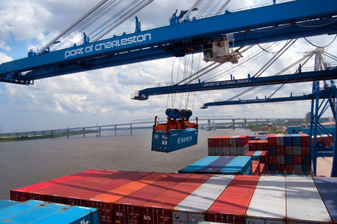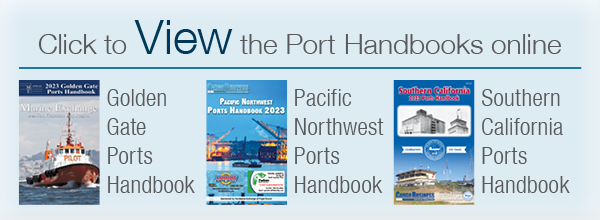|
Last week the U.S. Coast Guard announced its approval for U.S. ports to verify the weight of containers on behalf of the shipper to comply with the Safety of Life at Sea (SOLAS) regulations that are effective July 1, and the South Carolina Ports Authority (SCPA) has said it will provide this weight to the shipper or exporter.
"It has been our position all along that we have employed a best practice in safely loading ships in our port for the last 20 years due to our weighing of all export containers," said Jim Newsome, SCPA president and CEO. "We applaud the Coast Guard for recognizing this in its recent Declaration of Equivalency to the International Maritime Organization on the SOLAS regulations."
All scales used to weigh export containers at SCPA's North Charleston and Wando Welch terminals will be certified annually by the South Carolina Department of Agriculture, the competent certification authority in the State of South Carolina. The port's current scales were certified in January, 2016.
Once a timely request from an export shipper is received, the port says it will provide the shipper the estimated gross weight of the container and cargo derived in the following way:
- Gross weight of tractor (including estimate of fuel weight), container, chassis and cargo will be determined by weighing the entire unit on the scale.
- Deduction will be made for weight of tractor and fuel as provided by the truck driver to the interchange clerk along with the posted tare weight of the chassis.
- After these deductions, the gross weight of the container and cargo will be provided to the shipper. This is the same weight that will be provided directly to the shipping line.
- While this approach conforms with the methodology outlined by the IMO Maritime Safety Committee in its "Guidelines Regarding the Verified Gross Mass of a Container Carrying Cargo" published June 9, 2014, in providing this weight, SCPA does not certify its accuracy. Rather, it makes its best efforts to ensure the provision of an accurate weight using the methodology above.
|

- It is the clear responsibility of the shipper to provide the required weight certification to the shipping line as specified in the SOLAS regulations.
- The export shipper shall pay a fee of $25 per container weighed. Billing and payment arrangements must be made prior to the provision of such services.
- The methodology for providing this weighing service is specifically detailed below.
SCPA will utilize the following YMS Weighing Process for Loaded Export Containers:
- The Motor Carrier enters the perimeter security gate.
- The Motor Carrier arrives at the Inbound Interchange.
- The Tractor, Chassis, Container (and contents), and any accessories (i.e. genset) are weighed to establish the gross weight.
- The computer system, automatically subtracts the tare weight of the container, chassis, and then the estimated weight of the genset and tractor.
- At that this point, the estimated cargo weight is calculated.
- Depending of the Ocean Carriers' request, SCPA will EDI either the content weight or the gross weight of the loaded container.
- Also, SCPA will share the requested weights with the stevedores electronic Container Gross Weight.
|




